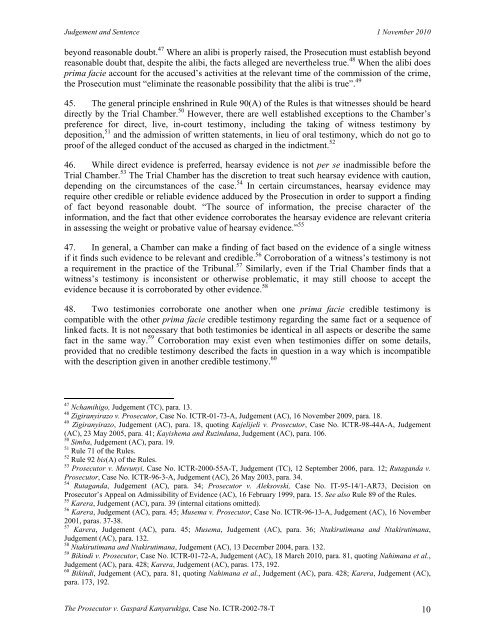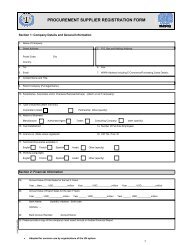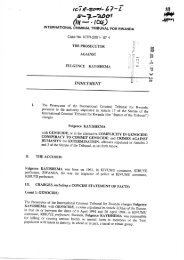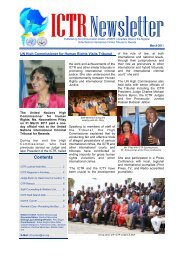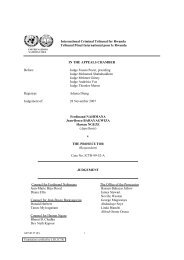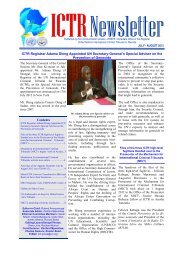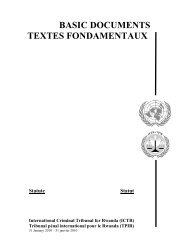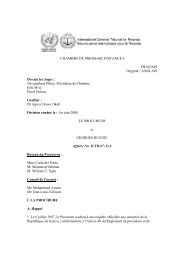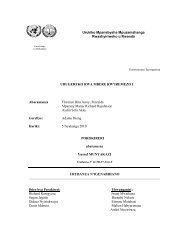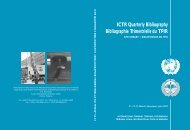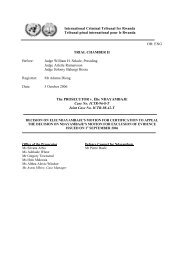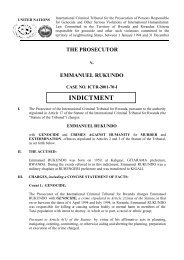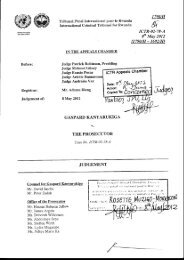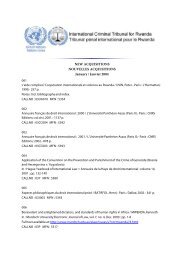Kanyarukiga - JUDGEMENT AND SENTENCE - Refworld
Kanyarukiga - JUDGEMENT AND SENTENCE - Refworld
Kanyarukiga - JUDGEMENT AND SENTENCE - Refworld
You also want an ePaper? Increase the reach of your titles
YUMPU automatically turns print PDFs into web optimized ePapers that Google loves.
Judgement and Sentence 1 November 2010<br />
beyond reasonable doubt. 47 Where an alibi is properly raised, the Prosecution must establish beyond<br />
reasonable doubt that, despite the alibi, the facts alleged are nevertheless true. 48 When the alibi does<br />
prima facie account for the accused’s activities at the relevant time of the commission of the crime,<br />
the Prosecution must “eliminate the reasonable possibility that the alibi is true”. 49<br />
45. The general principle enshrined in Rule 90(A) of the Rules is that witnesses should be heard<br />
directly by the Trial Chamber. 50 However, there are well established exceptions to the Chamber’s<br />
preference for direct, live, in-court testimony, including the taking of witness testimony by<br />
deposition, 51 and the admission of written statements, in lieu of oral testimony, which do not go to<br />
proof of the alleged conduct of the accused as charged in the indictment. 52<br />
46. While direct evidence is preferred, hearsay evidence is not per se inadmissible before the<br />
Trial Chamber. 53 The Trial Chamber has the discretion to treat such hearsay evidence with caution,<br />
depending on the circumstances of the case. 54 In certain circumstances, hearsay evidence may<br />
require other credible or reliable evidence adduced by the Prosecution in order to support a finding<br />
of fact beyond reasonable doubt. “The source of information, the precise character of the<br />
information, and the fact that other evidence corroborates the hearsay evidence are relevant criteria<br />
in assessing the weight or probative value of hearsay evidence.” 55<br />
47. In general, a Chamber can make a finding of fact based on the evidence of a single witness<br />
if it finds such evidence to be relevant and credible. 56 Corroboration of a witness’s testimony is not<br />
a requirement in the practice of the Tribunal. 57 Similarly, even if the Trial Chamber finds that a<br />
witness’s testimony is inconsistent or otherwise problematic, it may still choose to accept the<br />
evidence because it is corroborated by other evidence. 58<br />
48. Two testimonies corroborate one another when one prima facie credible testimony is<br />
compatible with the other prima facie credible testimony regarding the same fact or a sequence of<br />
linked facts. It is not necessary that both testimonies be identical in all aspects or describe the same<br />
fact in the same way. 59 Corroboration may exist even when testimonies differ on some details,<br />
provided that no credible testimony described the facts in question in a way which is incompatible<br />
with the description given in another credible testimony. 60<br />
47 Nchamihigo, Judgement (TC), para. 13.<br />
48 Zigiranyirazo v. Prosecutor, Case No. ICTR-01-73-A, Judgement (AC), 16 November 2009, para. 18.<br />
49 Zigiranyirazo, Judgement (AC), para. 18, quoting Kajelijeli v. Prosecutor, Case No. ICTR-98-44A-A, Judgement<br />
(AC), 23 May 2005, para. 41; Kayishema and Ruzindana, Judgement (AC), para. 106.<br />
50 Simba, Judgement (AC), para. 19.<br />
51 Rule 71 of the Rules.<br />
52 Rule 92 bis(A) of the Rules.<br />
53 Prosecutor v. Muvunyi, Case No. ICTR-2000-55A-T, Judgement (TC), 12 September 2006, para. 12; Rutaganda v.<br />
Prosecutor, Case No. ICTR-96-3-A, Judgement (AC), 26 May 2003, para. 34.<br />
54 Rutaganda, Judgement (AC), para. 34; Prosecutor v. Aleksovski, Case No. IT-95-14/1-AR73, Decision on<br />
Prosecutor’s Appeal on Admissibility of Evidence (AC), 16 February 1999, para. 15. See also Rule 89 of the Rules.<br />
55 Karera, Judgement (AC), para. 39 (internal citations omitted).<br />
56 Karera, Judgement (AC), para. 45; Musema v. Prosecutor, Case No. ICTR-96-13-A, Judgement (AC), 16 November<br />
2001, paras. 37-38.<br />
57 Karera, Judgement (AC), para. 45; Musema, Judgement (AC), para. 36; Ntakirutimana and Ntakirutimana,<br />
Judgement (AC), para. 132.<br />
58 Ntakirutimana and Ntakirutimana, Judgement (AC), 13 December 2004, para. 132.<br />
59 Bikindi v. Prosecutor, Case No. ICTR-01-72-A, Judgement (AC), 18 March 2010, para. 81, quoting Nahimana et al.,<br />
Judgement (AC), para. 428; Karera, Judgement (AC), paras. 173, 192.<br />
60 Bikindi, Judgement (AC), para. 81, quoting Nahimana et al., Judgement (AC), para. 428; Karera, Judgement (AC),<br />
para. 173, 192.<br />
The Prosecutor v. Gaspard <strong>Kanyarukiga</strong>, Case No. ICTR-2002-78-T 10


